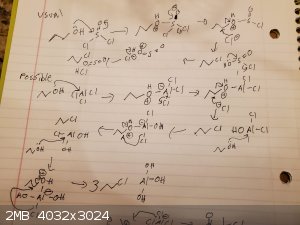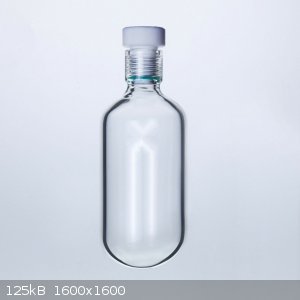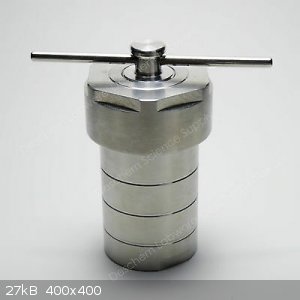EverythingAl2O3
Hazard to Self
 
Posts: 51
Registered: 3-9-2019
Member Is Offline
|
|
AlCl3 is an alternative to SOCl2
Hey everyone. I was thinking about reactions for Al2O3 (Not kidding really do this every second I have time to think) and my mind turned to
halogenation of primary alcohols and how SOCl2 kinda sucks but is the only option.
So I thought about the mechanisms of how they work, and realized that AlCl3 works in a very similar way in Friedel-Crafts alkylation. So I came up
with the mechanism attached and thought it looked good and set out to find a paper to confirm my hypothesis and low and behold here it is. I do not
know its effects in aliphatic alcohols but benzylic alcohols work very well. (I'm aware anhydrous AlCl3 has its dangers but nothing near SOCl2 with
the HCl and SO2)
So for anyone who is looking to do this type of reaction with any type of primary alcohol but doesn't want to use SOCl2, you might want to give this a
try instead.
Edit By extension this might mean bromination and iodination by AlBr3 and AlI3 may be possible.

Attachment: A_New_Facile_Route_to_Chlorination_of_Alcohols_via.pdf (375kB)
This file has been downloaded 431 times
[Edited on 4-12-2020 by EverythingAl2O3]
|
|
|
Opylation
Hazard to Others
  
Posts: 131
Registered: 30-8-2019
Member Is Offline
|
|
Alcl3 cannot be used to form alkyl halide (very well). The product formed will mostly me aluminum trialkoxides. There is a caveat though, I have seen
some people used iodine and aluminum to form methyl iodide but it’s terrible yields
It's odd though because using the constituents enthalpies of formation technically alkyl chlorides are more thermodynamically favorable. At least when
dealing with isopropanol and aluminum chloride. I couldn't find info on Al(OC2H5)3 thermodynamics. Must be other factors at play. I think it has
something to do with reduction potentials
I'm gonna guess it has to do with Aluminum Trichloride being such a powerful lewis acid it binds hard to the alcohol oxygens electrons, creating a
positive charge on the oxygen and booting off the proton. The protons get scavenged by the chloride anion and since hydrogen chloride is volatile it
escapes via the heat of reaction.
It's interesting though because AlCl3 is used to deprotonate aryl ethers and the resulting product is deprotection, after reacting with water. Maybe
since arene's are electron dense the aluminum and arene are in a stalemate due to electron deficiencies in the reaction medium. Add a little water and
everyone's happy.
[Edited on 4-12-2020 by Opylation]
|
|
|
EverythingAl2O3
Hazard to Self
 
Posts: 51
Registered: 3-9-2019
Member Is Offline
|
|
Interesting that it doesn't tend to yield well. If that is normally the case then this paper found a niche use in benzylic alcohols because they had
yields between 50-99%.
Are typical chlorination procedures done in pure alcohol and AlCl3, with the alcohol acting like a solvent and reagent? That might be a significant
factor. In the paper it looks like they used dioxane as the major solvent and added the alcohol as a minor constituent. With that the dioxane might be
a bad enough base that it doesn't want to pick up the hydrogen so it's stuck with it until the chlorine has time to attack and relieves the acidity.
|
|
|
clearly_not_atara
International Hazard
    
Posts: 2799
Registered: 3-11-2013
Member Is Offline
Mood: Big
|
|
AlCl3 will not chlorinate alcohols. However, solutions of AlCl3 in hydrochloric acid will. But ZnCl2 or even CaCl2 produce a similar effect while
being easier to handle.
| Quote: | | It's odd though because using the constituents enthalpies of formation technically alkyl chlorides are more thermodynamically favorable.
|
You're ignoring the huge entropy of HCl (g).
|
|
|
EverythingAl2O3
Hazard to Self
 
Posts: 51
Registered: 3-9-2019
Member Is Offline
|
|
| Quote: |
AlCl3 will not chlorinate alcohols. However, solutions of AlCl3 in hydrochloric acid will. But ZnCl2 or even CaCl2 produce a similar effect while
being easier to handle.
|
But does that assume aqueous/protic solvent HCl solutions or does this also include polar aprotic solvent? If it does assume protic solvents then
wouldn't you be promoting Sn1 for 1* and 2* carbocations and using the Cl salts to try and boost the Cl- concentration to promote Sn2 in bad Sn2
conditions?
|
|
|
Errata
Harmless

Posts: 5
Registered: 6-9-2020
Member Is Offline
Mood: Yes
|
|
Chlorodehydration can be done using TCCA in DMF according to this paper: Trichloroisocynuric Acid/DMF as Efficient Reagent for Chlorodehydration of Alcohols Under Conventional and Ultrasonic Conditions. Paper doesn't
mention if DMF is required or if it can be substituted for another aprotic solvent. Might be worth trying DMSO, propylene carbonate, or acetonitrile.
Edit: The paper actually does mention how it works, just forgot. Aprotic Amide acts as an intermediate catalyst for the reaction.
N-Methyl-2-pyrrolidone seems like a cheaper alternative to DMF, but no idea if it would actually work. The actual solvent is DCM, and DMF was just the
catalyst.
[Edited on 14-12-2020 by Errata]
|
|
|
ChemichaelRXN
Hazard to Others
  
Posts: 103
Registered: 7-10-2010
Member Is Offline
Mood: Universal Eye
|
|
Here is some more info. on TCCA reactions; https://www.organic-chemistry.org/chemicals/oxidations/trich...
Do you think adding conc. HCl and the alcohol you want to chlorinate (in my case sulfurol) in a pressure vessel and add heat, it would chlorinate
better than just boiling it at standard pressure? I am guessing it would and maybe that is the key. I was thinking on using one of these just to
experiment that you can get from Deschem (Glass High Pressure Vessel). It can hold pressure to Max Pressure of 0.6mpa or 87psi. Water is 14psi at 99C,
not sure about HCl. Maybe it would work, but I havent researched it much. I will have to try it out in a water bath...just stand back an watch it. lol

You are the same perception looking out, from the same elements around the universe.
You are everything to be anything to begin with.
Https://you-are.space
Https://syntharise.com
|
|
|
Errata
Harmless

Posts: 5
Registered: 6-9-2020
Member Is Offline
Mood: Yes
|
|
There are also hydrothermal synthesis reactors on amazon, no need for special suppliers. I bought one for about 100 bucks, they're good to about 6MPa
and 240 C. Comes with a teflon sleeve to protect the steel, so it could work with HCl.
|
|
|
ChemichaelRXN
Hazard to Others
  
Posts: 103
Registered: 7-10-2010
Member Is Offline
Mood: Universal Eye
|
|
Mine are 0.6Mpa or 87psi. I guess a hot water bath would be safe enough.
I just bought one too; Hydrothermal Autoclave Reactor
(1). Operating temperature: 180c
(2). Working pressure: 3MPa (gauge) or 435psi
(3). Heating, cooling rate: 5 c / min
Time to try it out when received.
Very excited!
[Edited on 15-12-2020 by ChemichaelRXN]

You are the same perception looking out, from the same elements around the universe.
You are everything to be anything to begin with.
Https://you-are.space
Https://syntharise.com
|
|
|
symboom
International Hazard
    
Posts: 1143
Registered: 11-11-2010
Location: Wrongplanet
Member Is Offline
Mood: Doing science while it is still legal since 2010
|
|
Awesome device I've seen a video of someone using those to convert white phosphorous to red phosphorous.
I wonder if the autoclave could be used for hydrogenation using titanium hydride as the hydrogen source.
|
|
|
ChemichaelRXN
Hazard to Others
  
Posts: 103
Registered: 7-10-2010
Member Is Offline
Mood: Universal Eye
|
|
Thanks for talking about it for me to get one. Not too familiar with titanium hydride, maybe sodium borohydride. I would have to research how it
reduces primary, secondary and tertiary nitro groups. I cant recall the details. Been working a lot with my mind elsewhere from chemistry which is not
acceptable lol I have to get back to the past time I love better than video games.
[Edited on 15-12-2020 by ChemichaelRXN]
You are the same perception looking out, from the same elements around the universe.
You are everything to be anything to begin with.
Https://you-are.space
Https://syntharise.com
|
|
|